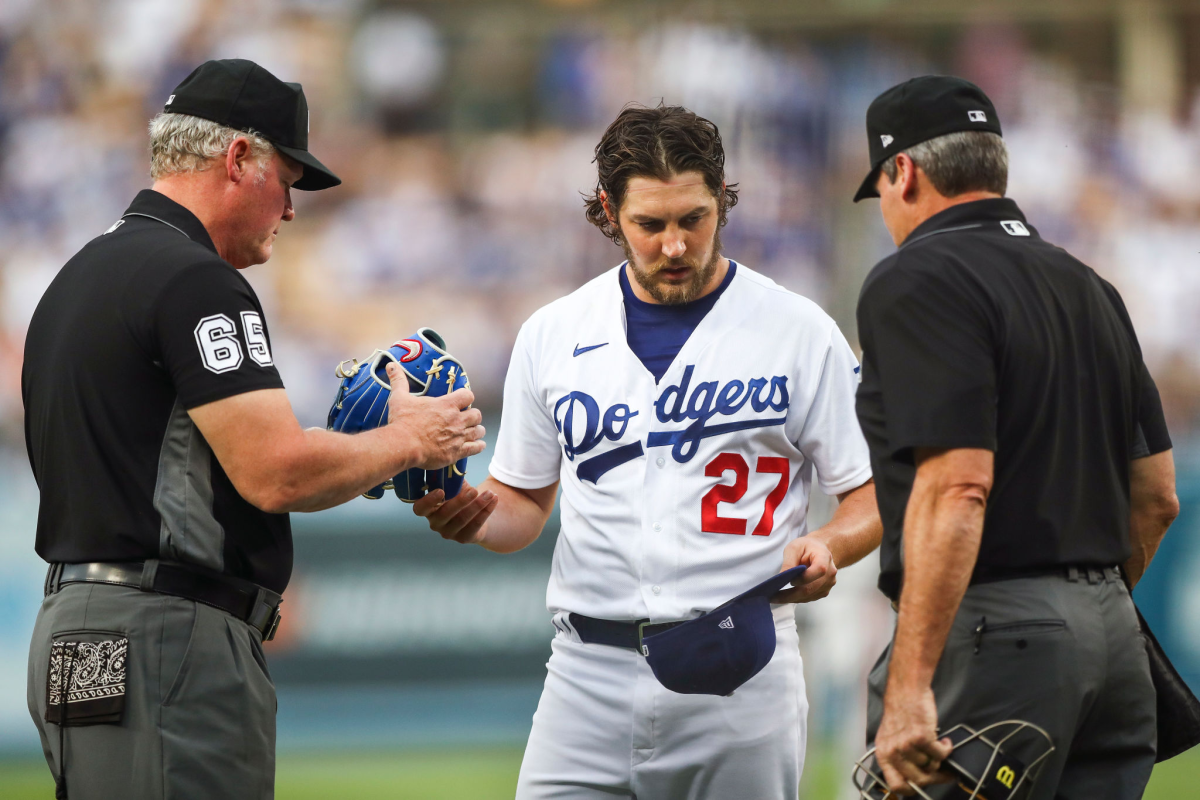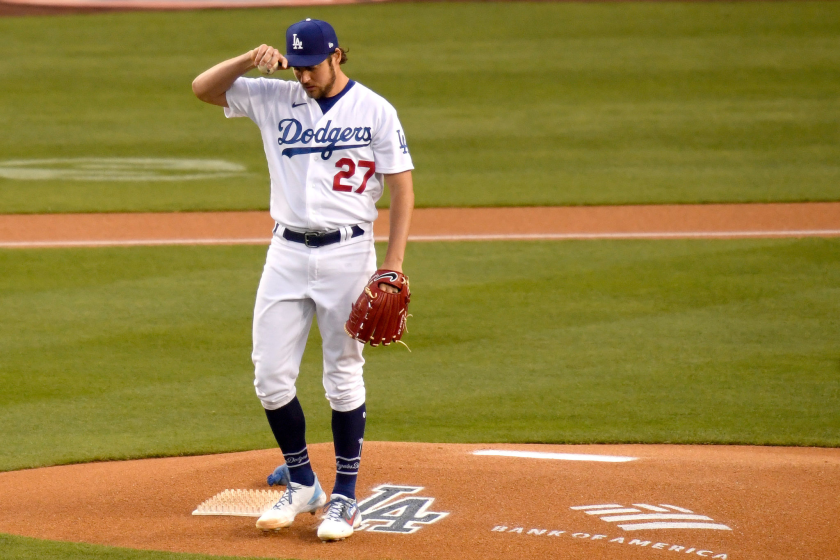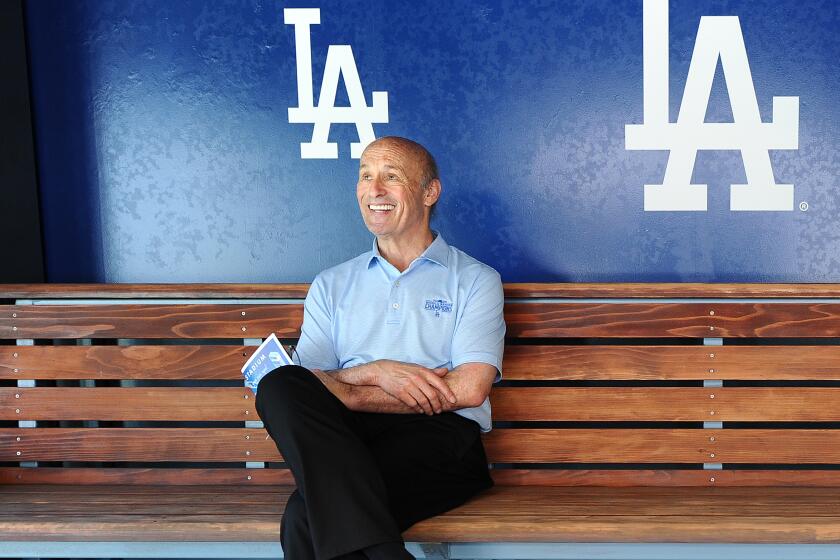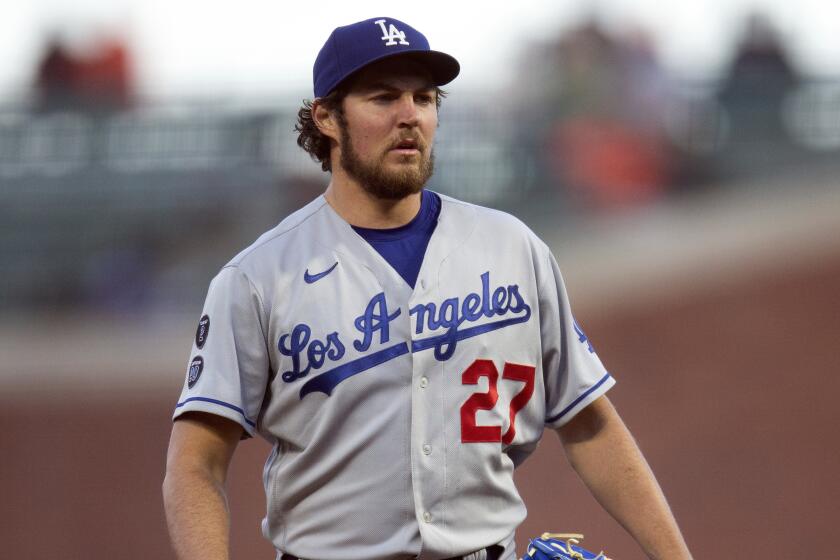Q&A: What will Trevor Bauer face from MLB now that criminal charges won’t be filed?

- Share via
For six months, Dodgers pitcher Trevor Bauer and a San Diego woman have waited to hear whether he would be charged with sexual assault over two encounters that his representatives said were “wholly consensual” and the woman said were not.
The answer came Tuesday. The Los Angeles County district attorney’s office declined to charge Bauer with a criminal offense.
With the allegations resolved by the justice system, questions and answers about what happens next:
The Dodgers are set to start spring training next week, so Bauer can join them, right?
Well, about next week ...
The L.A. County D.A. declined to charge Trevor Bauer with sexual assault, but Major League Baseball could still suspend the Dodgers pitcher.
Ah, right. The owners have locked out the players. But, whenever the Dodgers get started this year, Bauer can join them, right?
Tuesday’s decision does not mean Bauer is cleared to resume his career. Police investigated Bauer, but so did Major League Baseball. The league’s domestic violence and sexual assault policy specifically allows the commissioner to suspend a player even if he is not charged with a crime.
Is MLB expected to suspend Bauer?
Yes.
Based on what?
The policy states that “a single incident of abusive behavior … may subject a player to discipline.” The woman has provided medical records in which doctors diagnosed her with “assault by manual strangulation” and “acute head injury” following a sexual encounter with Bauer. The pitcher’s legal team has contested the accuracy of the medical assessment.
The judge who denied the woman a restraining order against him said her injuries, as depicted in photographs, were “terrible,” even if she was “not ambiguous about wanting rough sex in the … first encounter and wanting rougher sex in the second encounter.”
In a video Tuesday, Bauer said the woman had stayed overnight after both encounters and left the next morning “without any incident or concern.”
He added: “When she left, she certainly did not look anything like the photos that were later attached to her family court declaration and circulated by her lawyers to the media.”
He also said: “I never assaulted her in any way, at any time. And, while we did have consensual rough sex, the disturbing acts and conduct she described simply did not occur.”
The Washington Post reported that an Ohio woman had made similar allegations against Bauer, which he has dismissed as “categorically false.” The Ohio woman has cooperated with MLB investigators.
Of the 15 players that have been suspended under the policy, none had been publicly identified with more than one alleged victim.
Upon signing Trevor Bauer, the Dodgers cited a thorough vetting process; now Bauer’s career as a Dodger is in limbo. How a $102-million risk went wrong.
So what happens next?
Now that Bauer need not worry that anything he says could be used against him in a criminal case, MLB is expected to ask Bauer to meet with its investigators as required under the league policy. MLB investigators would share their findings with Bauer and allow him to respond, and to provide any information he believes the league should consider.
How long might a suspension last?
Previous suspensions have ranged from 15 games to 162 games. In a normal year, 162 games is a full season.
Can Bauer appeal a suspension?
Yes, but every player suspended has reached a negotiated settlement. If Bauer were willing to consider a negotiated settlement, he could ask that it include time served. He was on leave for the second half of last season, so he could say he already has served half a season.
The possibility that Dodgers pitcher Trevor Bauer could be suspended might raise a thorny question: Just what is the appropriate length of a suspension?
Bauer maintains he has done nothing wrong, and he might not be willing to negotiate. If he appeals, an independent arbitrator would hear the case.
In 2014, when MLB suspended Alex Rodriguez for 211 games for “use and possession of numerous forms of prohibited performance-enhancing substances … over the course of multiple years,” an arbitrator reduced the suspension to 162 games. In 2012, after Ryan Braun had been suspended 50 games for testing positive for performance-enhancing substances, the suspension was thrown out via arbitration because testing protocols had not been followed.
Bauer essentially could aim to put commissioner Rob Manfred on trial, claiming the league would be trying to equate unconventional but consensual sex with domestic violence and sexual assault.
However, while baseball’s drug policy allows suspended players to keep playing until an appeal is heard, the domestic violence policy has no such provision.
Dodgers president Stan Kasten writes in staff memo the team does not condone or excuse any acts of domestic violence or sexual assault.
Would Manfred suspend Bauer while a lockout is in force?
It’s unlikely.
The Dodgers have two proven starting pitchers, Walker Buehler and Julio Urías. Would they welcome back Bauer, whenever that might be?
Major league sources consider that unlikely, but the Dodgers have remained publicly silent on that question.
After MLB put Washington Nationals infielder Starlin Castro on leave last year to investigate domestic violence allegations against him, the Nationals said Castro would not return to the team. He was suspended, then released at the conclusion of the suspension.
Could the Dodgers release Bauer?
They could, so long as they pay off the balance of his contract.
Dodgers pitcher Trevor Bauer is on paid administrative leave after being accused by a woman of sexual assault. Here’s our coverage.
They owe him $32 million for the 2022 season and another $32 million for the 2023 season, although suspensions are unpaid — and, during a lockout, so are salaries.
If the Dodgers wish to cut Bauer after a suspension and not pay the balance of his contract, they could argue they had acted in accordance with the standard player contract, which allows a team to terminate the deal should the player “fail, refuse or neglect to conform his personal conduct to the standards of good citizenship and good sportsmanship.”
That likely would trigger a grievance. In 2004, after pitcher Denny Neagle was cited on suspicion of soliciting a prostitute, the Colorado Rockies terminated his contract, citing that very same language from the standard player contract.
Neagle filed a grievance. In 2005, he and the Rockies reached a settlement under which he was paid roughly $16 million of the $19.5 million left on his contract, according to the Denver Post. In 2006, Neagle pleaded guilty to the lesser charge of “patronizing a prostitute” and was sentenced to 40 hours of community service.
More to Read
Are you a true-blue fan?
Get our Dodgers Dugout newsletter for insights, news and much more.
You may occasionally receive promotional content from the Los Angeles Times.
















